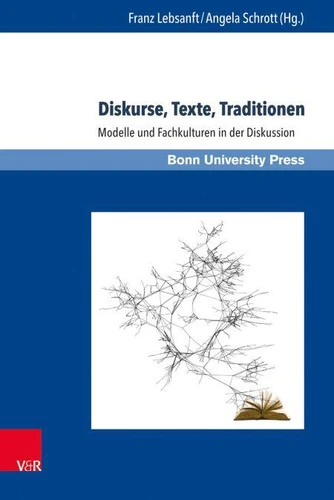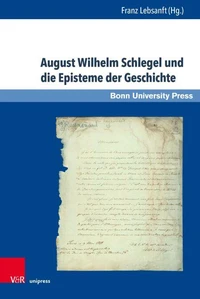Diskurse, Texte, Traditionen. Modelle und Fachkulturen in der Diskussion
Par : , , ,Formats :
Disponible dans votre compte client Decitre ou Furet du Nord dès validation de votre commande. Le format PDF est :
- Compatible avec une lecture sur My Vivlio (smartphone, tablette, ordinateur)
- Compatible avec une lecture sur liseuses Vivlio
- Pour les liseuses autres que Vivlio, vous devez utiliser le logiciel Adobe Digital Edition. Non compatible avec la lecture sur les liseuses Kindle, Remarkable et Sony
 , qui est-ce ?
, qui est-ce ?Notre partenaire de plateforme de lecture numérique où vous retrouverez l'ensemble de vos ebooks gratuitement
Pour en savoir plus sur nos ebooks, consultez notre aide en ligne ici
- Nombre de pages394
- FormatPDF
- ISBN978-3-8470-0282-6
- EAN9783847002826
- Date de parution16/09/2015
- Protection num.pas de protection
- Taille3 Mo
- Infos supplémentairespdf
- ÉditeurV&R Unipress
Résumé
What do opening dialogues, sonnets and the interaction style of the most diverse cultural and social groups share in common? The connecting element is the traditionality of speech - all speakers follow cultural patterns to convey their communicative intentions appropriately and successfully. In the same way as a sonnet or a novel is shaped by literary traditions of textual form, opening dialogues or speech styles that people cultivate in different contexts and communicative situations follow cultural traditions and habits.
The starting point of this volume is the function of discursive traditions - a subject of intensive debate in recent years - that are a form of cultural knowledge and guide the textual form and thus constitute the essence of a culturally oriented linguistics. Research on the (romanistic) discursive tradition looks into the cultural techniques of speech in different linguistic and cultural areas and their relevance for shaping societal and cultural groups.
On the basis of theory formation in Romanistic studies this volume presents and discusses models and methods developed in different areas of study that explain how traditions influence our speech and our writing. It opens up perspectives for an interdisciplinary philological and cultural analysis of texts and discourse.
The starting point of this volume is the function of discursive traditions - a subject of intensive debate in recent years - that are a form of cultural knowledge and guide the textual form and thus constitute the essence of a culturally oriented linguistics. Research on the (romanistic) discursive tradition looks into the cultural techniques of speech in different linguistic and cultural areas and their relevance for shaping societal and cultural groups.
On the basis of theory formation in Romanistic studies this volume presents and discusses models and methods developed in different areas of study that explain how traditions influence our speech and our writing. It opens up perspectives for an interdisciplinary philological and cultural analysis of texts and discourse.
What do opening dialogues, sonnets and the interaction style of the most diverse cultural and social groups share in common? The connecting element is the traditionality of speech - all speakers follow cultural patterns to convey their communicative intentions appropriately and successfully. In the same way as a sonnet or a novel is shaped by literary traditions of textual form, opening dialogues or speech styles that people cultivate in different contexts and communicative situations follow cultural traditions and habits.
The starting point of this volume is the function of discursive traditions - a subject of intensive debate in recent years - that are a form of cultural knowledge and guide the textual form and thus constitute the essence of a culturally oriented linguistics. Research on the (romanistic) discursive tradition looks into the cultural techniques of speech in different linguistic and cultural areas and their relevance for shaping societal and cultural groups.
On the basis of theory formation in Romanistic studies this volume presents and discusses models and methods developed in different areas of study that explain how traditions influence our speech and our writing. It opens up perspectives for an interdisciplinary philological and cultural analysis of texts and discourse.
The starting point of this volume is the function of discursive traditions - a subject of intensive debate in recent years - that are a form of cultural knowledge and guide the textual form and thus constitute the essence of a culturally oriented linguistics. Research on the (romanistic) discursive tradition looks into the cultural techniques of speech in different linguistic and cultural areas and their relevance for shaping societal and cultural groups.
On the basis of theory formation in Romanistic studies this volume presents and discusses models and methods developed in different areas of study that explain how traditions influence our speech and our writing. It opens up perspectives for an interdisciplinary philological and cultural analysis of texts and discourse.





